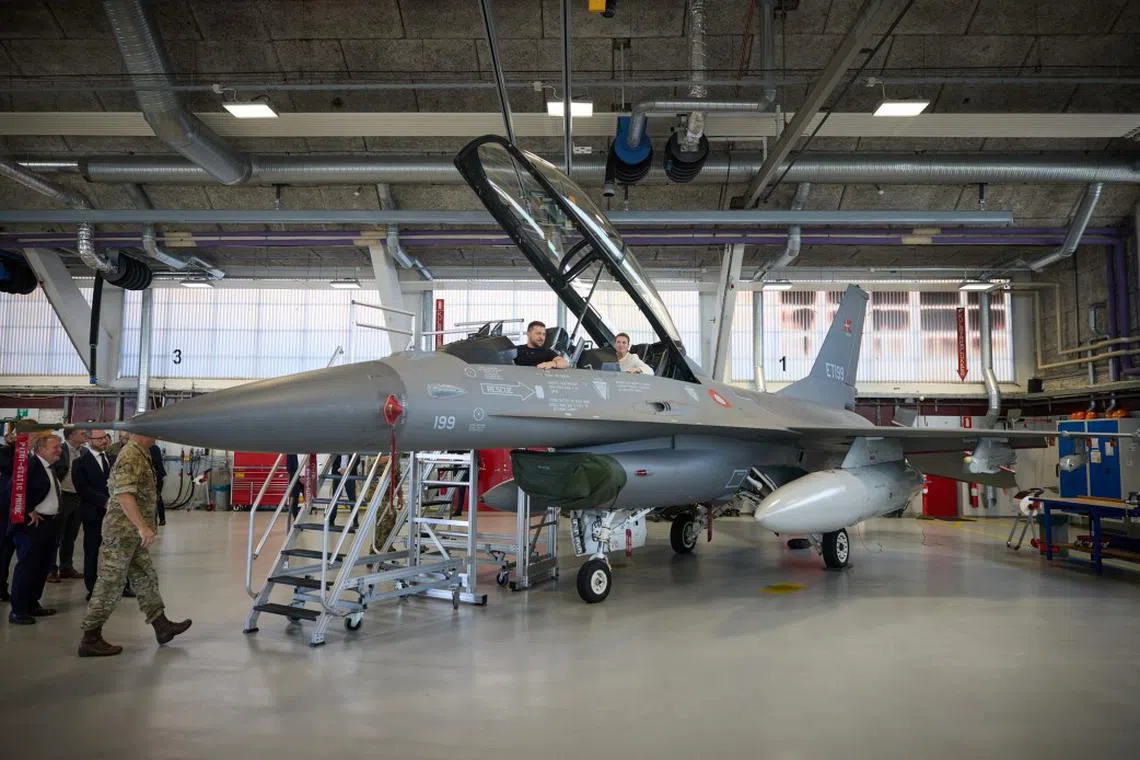What Ukraine's allies have said about striking Russia with Western weapons
Sign up now: Get ST's newsletters delivered to your inbox

A Ukrainian serviceman preparing to fire a howitzer towards Russian troops at a front line position in Ukraine's Kharkiv region, on May 21.
PHOTO: REUTERS
KYIV - Ukraine has urged its allies to allow Kyiv to use Western-supplied arms to conduct strikes inside Russia and abandon an official position some of them have held throughout Russia's 27-month-old full-scale invasion.
President Volodymyr Zelensky told Reuters on May 20 that talks had taken place with Kyiv's allies about using their weapons to strike Russian military targets at the border and further inside Russia.
He said the talks had yielded "nothing positive", but some partners have shifted their rhetoric on the matter.
Russian President Vladimir Putin warned Nato members on May 28 that they were playing with fire by proposing to let Ukraine use Western weapons to strike targets inside Russia.
Here's what Kyiv's partners have said:
The United States
Then-Joint Chiefs of Staff Chairman Mark Milley said in 2023: "I can say that we have asked the Ukrainians not to use US-supplied equipment for direct attacks into Russia."
US National Security Council spokesman John Kirby told a briefing on May 28 that Washington was aware of Mr Zelensky's comments on the matter.
"I would tell you that there's no change to our policy at this point. We don't encourage or enable the use of US-supplied weapons to strike inside Russia."
"We do not want this to escalate in any form," press secretary Karine Jean-Pierre told reporters at a White House briefing.
Nato chief Jens Stoltenberg
Nato Secretary-General Jens Stoltenberg has urged members of the Western military alliance to lift restrictions on the use of their weapons to allow Ukraine to strike "legitimate military targets" inside Russia.
"The time has come to consider whether it will be right to lift some of the restrictions which have been imposed because we see now that especially in the Kharkiv region, the front line and the borderline is more or less the same," said Mr Stoltenberg, adding the decision was up to each country.
Nato itself, as an organisation, does not deliver arms to Ukraine.
Britain
During a visit to Kyiv on May 3, British Foreign Secretary David Cameron told Reuters that Ukraine could use the weapons provided by London to strike targets inside Russia, and that it was up to Kyiv whether to do so.
"Ukraine has that right," he said.
"Just as Russia is striking inside Ukraine, you can quite understand why Ukraine feels the need to make sure it's defending itself."
France and Germany
French President Emmanuel Macron said on May 28 that Ukraine should be allowed to hit military sites inside Russia
"We think we should allow them to neutralise military sites from which missiles are fired, military sites from which Ukraine is attacked," he told a joint news conference with German Chancellor Olaf Scholz.
"(But) we shouldn't allow them to hit other targets in Russia and civilian or other military sites in Russia."
Asked about this, Mr Scholz said: "Ukraine has every possibility under international law for what it is doing. That has to be said explicitly."
"I find it strange when some people argue that it should not be allowed to defend itself and take measures that are suitable for this."
Denmark
Danish Prime Minister Mette Frederiksen echoed both Mr Scholz and Mr Stoltenberg in comments to broadcaster TV2 on May 28.
"You are welcome to use what we have donated to Ukraine, also outside of Ukraine - that is, on Russian targets - if it is within international law," she said.
"Nato's Secretary-General was very clear on this issue a few hours ago, that it is within the rules when you wage war because it is Ukraine that is being attacked by Russia."
She did not, however, say whether this would apply to the F-16 fighter jets which Ukraine is set to receive from Copenhagen over the summer.

Ukrainian President Volodymyr Zelensky and Danish Prime Minister Mette Frederiksen sitting in an F-16 jet during Mr Zelensky's visit to Denmark in 2023.
PHOTO: OFFICE OF THE PRESIDENT OF UKRAINE
The Netherlands
In response to a request for comment, the Dutch Defence Ministry said on May 29 that Ukraine should use donated weapons in line with international law.
"Beyond this, The Netherlands does not impose legal limitations on the use of weapons supplied by The Netherlands above or on Russian soil," it said.
Czech Republic
Czech Prime Minister Petr Fiala told a briefing on May 28 that statements on the matter by Mr Stoltenberg and others were "absolutely logical".
"Ukraine is a country defending itself against Russian aggression... and as an attacked country it certainly has all the rights to use all possibilities for its defence."
The Baltics
Lithuania has been vocal about its support for Ukraine's right to strike targets inside Russia.
"The way to react to Russia's aggression in Ukraine, and also in our countries, is to support Ukraine, is to allow Ukraine to use the weapons that they already have, the way that they need use them," Foreign Minister Gabrielius Landsbergis said on May 27.
"That is how you manage escalation... this is how you stop Russia."
Latvian President Edgars Rinkevics has also agreed with Nato’s Mr Stoltenberg, telling CNN on May 27 that it was “a critical moment” for Ukraine: “I think there is no rational, pragmatic reason not to allow Ukraine to use those weapons against Russia in a way that is most efficient.”
A day later, Estonian Defence Minister Hanno Pevkur called on X for Kyiv's allies to "increase training for Ukrainian fighters (and) allow Ukraine to strike military targets in Russia." REUTERS


